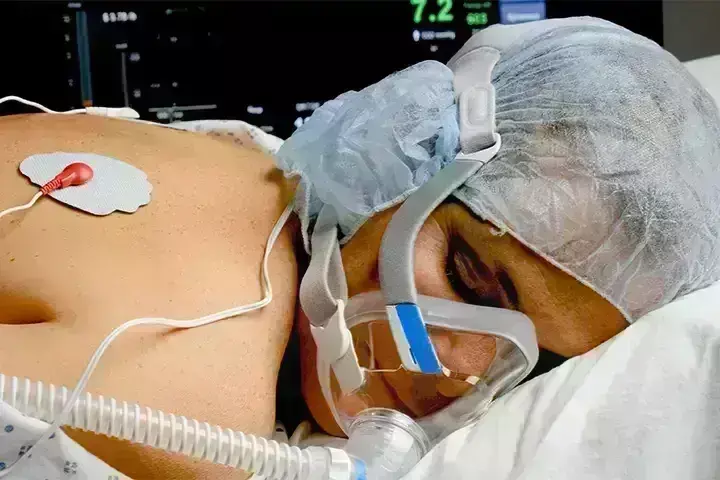- Home
- Medical news & Guidelines
- Anesthesiology
- Cardiology and CTVS
- Critical Care
- Dentistry
- Dermatology
- Diabetes and Endocrinology
- ENT
- Gastroenterology
- Medicine
- Nephrology
- Neurology
- Obstretics-Gynaecology
- Oncology
- Ophthalmology
- Orthopaedics
- Pediatrics-Neonatology
- Psychiatry
- Pulmonology
- Radiology
- Surgery
- Urology
- Laboratory Medicine
- Diet
- Nursing
- Paramedical
- Physiotherapy
- Health news
- Fact Check
- Bone Health Fact Check
- Brain Health Fact Check
- Cancer Related Fact Check
- Child Care Fact Check
- Dental and oral health fact check
- Diabetes and metabolic health fact check
- Diet and Nutrition Fact Check
- Eye and ENT Care Fact Check
- Fitness fact check
- Gut health fact check
- Heart health fact check
- Kidney health fact check
- Medical education fact check
- Men's health fact check
- Respiratory fact check
- Skin and hair care fact check
- Vaccine and Immunization fact check
- Women's health fact check
- AYUSH
- State News
- Andaman and Nicobar Islands
- Andhra Pradesh
- Arunachal Pradesh
- Assam
- Bihar
- Chandigarh
- Chattisgarh
- Dadra and Nagar Haveli
- Daman and Diu
- Delhi
- Goa
- Gujarat
- Haryana
- Himachal Pradesh
- Jammu & Kashmir
- Jharkhand
- Karnataka
- Kerala
- Ladakh
- Lakshadweep
- Madhya Pradesh
- Maharashtra
- Manipur
- Meghalaya
- Mizoram
- Nagaland
- Odisha
- Puducherry
- Punjab
- Rajasthan
- Sikkim
- Tamil Nadu
- Telangana
- Tripura
- Uttar Pradesh
- Uttrakhand
- West Bengal
- Medical Education
- Industry
Awake prone positioning may potentially harm COVID-19 patients with hypoxemia: JAMA

USA: A new article published in the Journal of American Medical Association suggests that in patients with COVID-19–associated hypoxemia who did not receive mechanical ventilation, prone posture had no therapeutic benefit. Furthermore, there was significant evidence of worsening clinical outcomes on research day 5 among patients who were recommended to get the awake prone positional intervention, indicating possible damage.
Awake prone posture may alleviate hypoxemia in COVID-19 patients, but whether it is connected with better clinical outcomes is uncertain. As a result, Edward Tang Qian and colleagues undertook this study to see if recommending awake prone lying is linked with better outcomes in patients with COVID-19–related hypoxemia that hasn't had mechanical ventilation.
During the COVID-19 pandemic, this pragmatic nonrandomized controlled experiment was done at two academic medical facilities. From May 13 to December 11, 2020, 501 adult patients with COVID-19–related hypoxemia who hadn't even undergone mechanical ventilation were included. Patients were randomly assigned to either the practitioner-recommended awake prone posture intervention (intervention group) or normal care. A bayesian proportional odds model based on the World Health Organization ordinal outcome scale with covariate adjustment for clinical severity ranking, which was adjusted to highlight the severe level of hypoxemia on trial day 5, was used for primary outcome analyses.
The key findings of this study were as follows:
1. A record number of 501 patients have been included in the study.
2. Baseline severity was comparable between the intervention and usual care groups,
- with 170 patients (65.9%) vs 162 patients (66.7%) receiving oxygen via standard low-flow nasal cannula,
- 71 patients (27.5%) vs 62 patients (25.5%) receiving oxygen via high-flow nasal cannula,
- and 16 patients (6.2%) receiving noninvasive positive-pressure ventilation.
3. According to nursing observations, patients in the intervention group maintained a median of 4.2 hours per day in the prone position, compared to 0 hours per day in the standard care group.
4. On the modified World Health Organization ordinal outcome scale, the Bayesian posterior likelihood of the intervention group outperforming the usual care group was 0.998 on research day 5.
5. On research days 14 and 28, however, the posterior probability of damage was 0.874 and 0.874, respectively.
6. The results of the exploratory experiments did not differ across groups.
In conclusion, these data imply that routine preferred use of prone posture among COVID-19 patients requiring supplemental oxygen but do not require invasive mechanical ventilation may not be linked with patient benefits.
Reference:
Qian ET, Gatto CL, Amusina O, et al. Assessment of Awake Prone Positioning in Hospitalized Adults With COVID-19: A Nonrandomized Controlled Trial. JAMA Intern Med. Published online April 18, 2022. doi:10.1001/jamainternmed.2022.1070
Medical Dialogues consists of a team of passionate medical/scientific writers, led by doctors and healthcare researchers. Our team efforts to bring you updated and timely news about the important happenings of the medical and healthcare sector. Our editorial team can be reached at editorial@medicaldialogues.in.
Dr Kamal Kant Kohli-MBBS, DTCD- a chest specialist with more than 30 years of practice and a flair for writing clinical articles, Dr Kamal Kant Kohli joined Medical Dialogues as a Chief Editor of Medical News. Besides writing articles, as an editor, he proofreads and verifies all the medical content published on Medical Dialogues including those coming from journals, studies,medical conferences,guidelines etc. Email: drkohli@medicaldialogues.in. Contact no. 011-43720751


